You don’t have to be a White Sox fan to notice this team has had a season well below expectations, even as the club continues to stay in the AL Central race. The pitching has been inconsistent at times, but for the most part, it’s been average to above average. Dylan Cease and Johnny Cueto have been so exciting to watch out of the gate. Liam Hendriks and Kendall Graveman have been locking up batters all season with their fantastic work out of the bullpen. The thorn in the side of this team has been the offense.
This offense can hit the ball. They actually do it a ton. Unfortunately, The vast majority of hits they get are singles to the opposite side. It seems that – until recently – the Sox have forgotten how to lift the ball in the air and push it over the fence.
Just how big of a problem is it in today’s game that the White Sox are 23rd in home runs as a team? Here is the data that shows just how important home runs are to the modern-day offense.
The Correlation Between Singles and Wins
One would think that the more singles you hit, the more games you win. In fact, we looked at batting average as the ideal hitting statistic for a long time, and batting average valued singles equal to home runs. Batting average, however, has its flaws, and in today’s game, singles aren’t as important as one might think. Let’s look at the data.
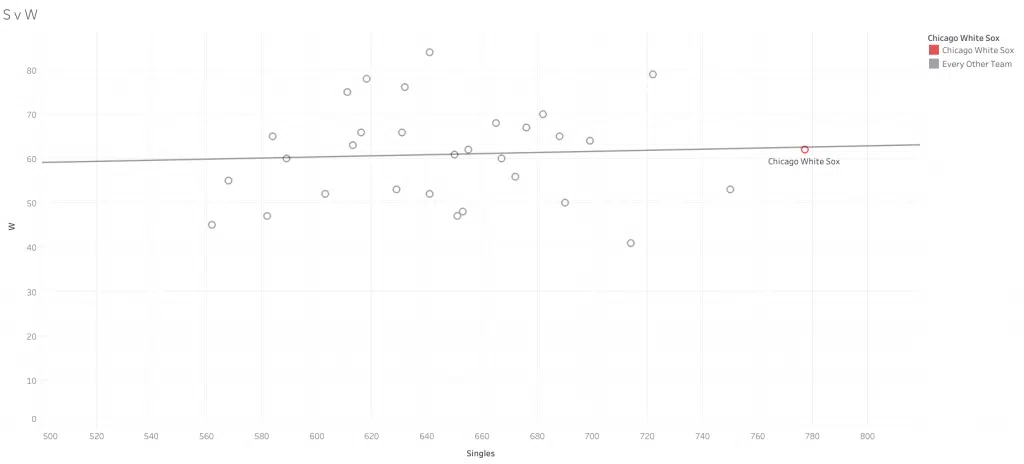
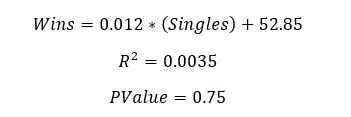
Before you get flashbacks to your high school stats class, here’s a little breakdown of what the data means. The coefficient, which is the number in front of “Singles”, shows that for every single an MLB team hits, their wins total goes up by .012. That isn’t a lot. The R-Squared Value describes how much of a correlation there is between the two variables: Singles and Wins. The R-Squared Value is, again, very low, which means that on the surface, there is very little correlation between hitting more singles and winning games. Finally, The P-Value tells us how significant the coefficient is. The goal is to have a P-Value below 0.05 – if it is, the coefficient of interest (in this case, “Singles”) is considered statistically significant and predictive of Wins. In this case, the P-Value is well above 0.05
What does this all mean? It shows that, for this year’s data, there is no correlation between singles and wins. Hitting more singles doesn’t mean a team is going to win more games. The White Sox are a perfect example of this – they currently lead the league in singles, and fans know that this hasn’t helped the team win more.
So, now that we know more about the correlation between singles and wins, let’s take a look at just how the White Sox’ season-long lack of home runs has affected their win total.
The Correlation Between Home Runs and Wins
This will come as no surprise to anyone, but the more home runs a team hits, the more games they will win. This graph shows exactly that.
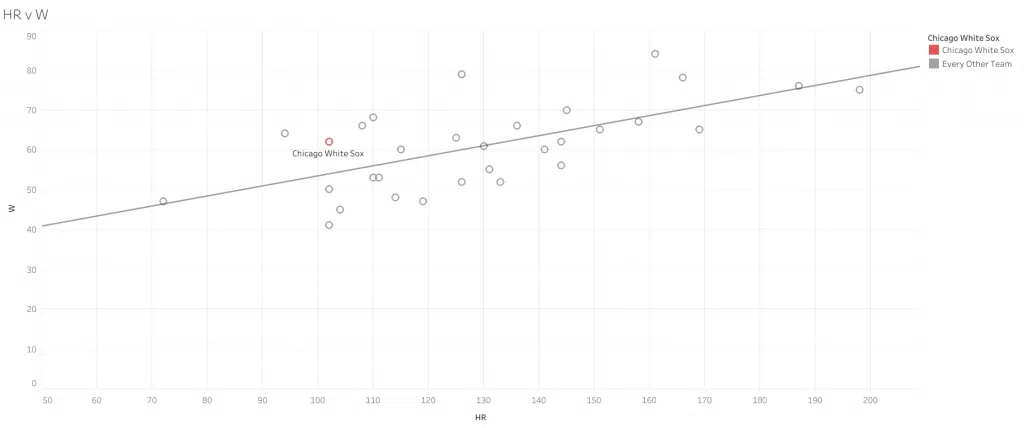
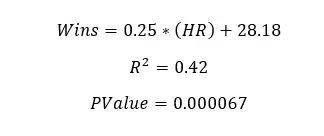
While this is hardly groundbreaking, the equations below the graph prove what many of us had already come to believe. The high R-Squared Value and the very low P-Value tell us that there is a significant correlation between home runs and wins. The important thing about this is the graph is the top equation.
The .25 tells us that every homerun hit increases wins by 25%. Here is an easy way of translating that: 4 HR = 1 W. In other words, if a team hits four home runs over two games, there is a high probability they won at least one of those games.
You’ll notice that the White Sox fall well above the trend line for home runs against wins. They’ve hit just over 100 home runs at the time of this writing, meaning they would only be predicted to have about 50-52 wins on the year. The fact that they’ve been able to outperform expectations is a testament to the aforementioned pitching staff, which has helped to keep the club in ball games in which the offense is only able to score a few runs.
The Correlation Between Walks and Wins
Out of curiosity, let’s look at walks and their correlation with wins.
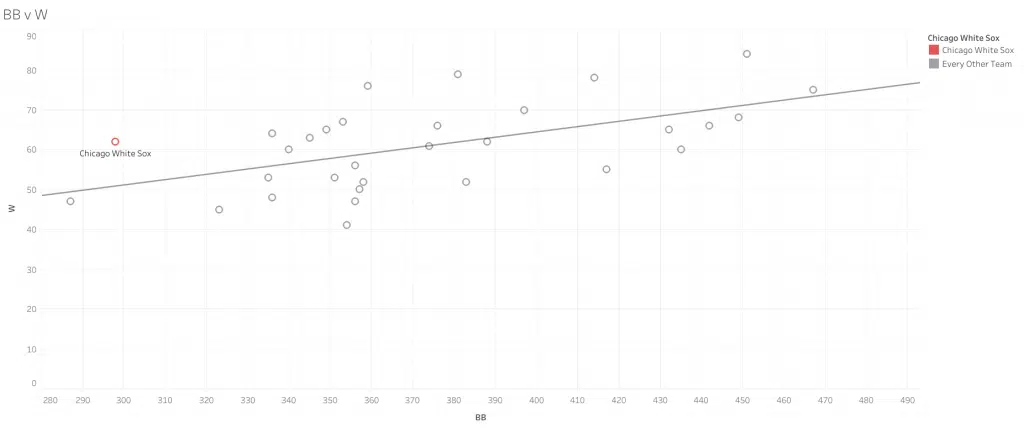
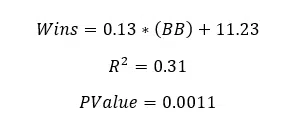
There is something interesting in this model: a statistically significant correlation between walks and wins, which didn’t exist for singles.
Now, this doesn’t mean walks are better than singles. Rather, it means that teams that walk more win more games than teams that hit singles do. While that may seem a bit confusing on the surface, it has to do with overall plate discipline. Teams that are more disciplined at the plate win more games. They work counts and take walks instead of being overly aggressive, and this leads to more extra-base hits and more damage done by the patient team.
Here are a few good examples. The Yankees lead the MLB in walks and home runs. The LA Dodgers are second in walks and fifth in home runs. The Houston Astros are fourth in home runs and eighth in walks. In essence: pitchers throw in the zone, the team hits a home run. As a result, the pitcher then throws out of the zone, and the team takes a walk.
Currently, the White Sox are 29th in walks and 23rd in home runs. If it feels like things have gotten better as of late, it’s because they have – as shown by Chris Kamka below:
Why This Matters for the White Sox
After seeing these correlations, we can see that the White Sox needed to make some important changes to succeed and recapture the AL Central crown. In their past seven games, the White Sox have hit the second-most home runs in baseball – which is a much better trend to see. However, they’re still just 16th in walks over that span, showing just how important the continued refinement of their plate approach is to their success. The team needs to be more patient in their approach and wait for pitches they can put over the fence. Pushing the ball the other way for a single is good at moving up a player’s batting average, but doesn’t necessarily lead to wins. They need to start seeing a lot more pitches at the plate and force the pitcher to throw them a bad pitch that they can take advantage of. This might lead to more strikeouts at first; however, it will lead to more wins in the future.
The White Sox have certainly made strides in the right direction in recent days. As the data shows, this is the sort of offensive output the South Siders will need if they want to pass the Twins and Guardians down the stretch this season.
Follow us @SoxOn35th for more updates throughout the season!
Featured Image: Kamil Krzaczynski-USA TODAY Sports

The analysis should use “runs” as the outcome, not “wins.” Otherwise it could be confounded by pitching/defense/etc, which we know have nothing to do with singles/HRs/walks. Since you only focus on 2022, it might be the case that teams that happen to have better pitching staffs also happen to hit more HRs and take more walks – which would lead to a correlation even if HRs/walks have nothing to do with scoring runs.